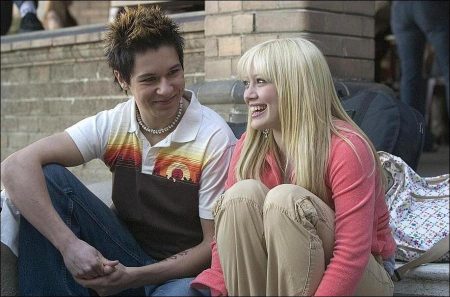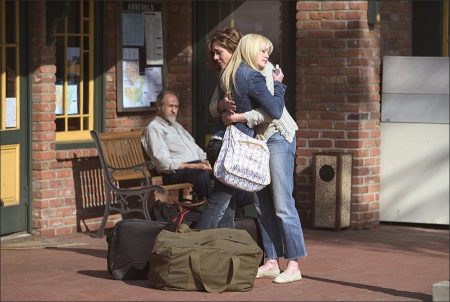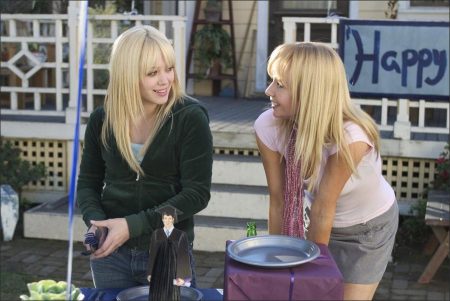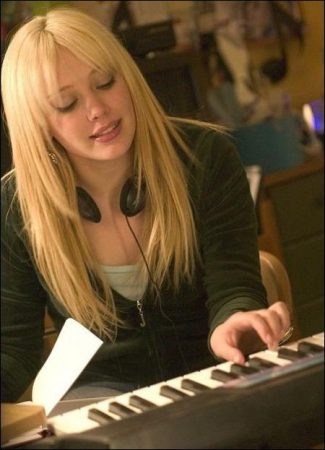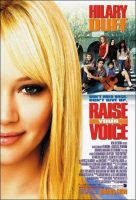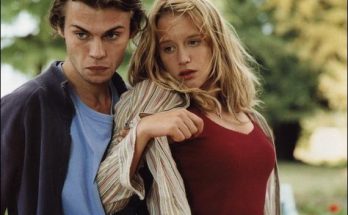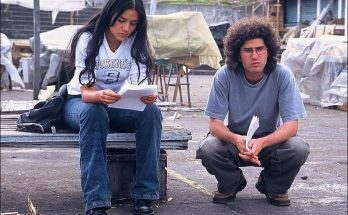The genesis of Raise Your Voice was born internally at New Line Cinema, when music executive Mitch Rotter pitched production president Toby Emmerich an idea about a talented small-town girl attending a music camp in the big city.
“We had wanted to do a truly music-driven film, something just short of a ‘sing at the drop of a hat’ musical, where the music was as much a part of the narrative as any of the other elements,” says Rotter. “After reading a lot of scripts, I still couldn’t find something that matched what we were looking for, basically a story about a young girl with a lot of talent who needs to overcome fear within herself to embrace this gift she has. We wanted it to have a strong inspirational element beyond the traditional fish-out-of-water story line.
More out of frustration than anything else, I wrote a short treatment to summarize the type of movie we were looking for. Doing this added a lot of shape and clarity to the idea and enabled me to come up with something richer than a dry synopsis. When I sent it to Toby, he pretty much said, ‘That sounds great, stop looking and let’s make this.’”
Rotter’s story idea found its way to Sara Risher, a former president of production at New Line Cinema, whose company ChickFlicks currently has a development deal at the studio.
“The studio approached me with an idea about doing a film based around a music school,” recalls producer Risher. “It was kind of an updated, contemporary version of Fame. I liked the idea and hired screenwriter Sam Schreiber, who had written a wonderful script I’m currently developing called Sticks and Stones. It’s set in the world of professional pool and revolves around the relationship of a father and daughter, so I knew he was really good with female characters and father/daughter relationships.”
“The biggest challenge in developing Mitch’s idea into a script was adding something unique to the musical summer camp idea from a direction that revealed things about Terri and what she’s going through,” says screenwriter Schreiber. “I decided to have her brother die in a car accident, which brought something a bit weightier to the story.”
The screenwriter continues, “Once I settled on that plot point, I shaped the rest of the characters in ways that either helped or hindered Terri as she tries to take advantage of life-changing opportunities, while coming to grips with the death of her brother. The story also had to have room to breathe since the material was heavy for the genre, so I knew many of the supporting characters would have to provide the comic relief in the film.”
In Schreiber’s original draft, New York City was the setting for the film, and although two separate attempts to get the project off the ground stalled, producer Sara Risher never lost faith.
“When a film is set up to go into pre-production and it doesn’t happen, it typically spells doom because all the momentum subsides and you lose everyone,” notes Risher. “When it happened to us, everyone moved on, but I couldn’t let it go because I knew it was a really great story.”
To get the project kick-started again, Risher needed a young actress for the role of Terri Fletcher who audiences could connect with in the coming-of-age story. “I remembered that I had been approached by Hilary Duff’s people a year before but at the time she was a little too young for the role,” said Risher. “I’d always thought of her as ‘Lizzie McGuire,’ but I realized she was almost 16-years-old, which is the age of the lead character in the film. She had just finished making The Lizzie McGuire Movie and was getting ready to record her first album, and you just got the sense that her career was set to really take off. So I reapproached Hilary and secured her participation in the project.”
The producer next found a director for the project in Sean McNamara, a DGA Award-nominated director for his work on the Disney Channel’s television series “Even Stevens,” as well as the Channel’s “The Even Stevens Movie.” !When I read Raise Your Voice, I thought it was fantastic,” says director McNamara. “It’s a story about a young girl trying to find the inner strength to follow her dream. Normally, when you read coming-of-age films aimed at younger audiences they’re kind of corny, but this story is more along the lines of the film Fame.”
“When I met with Sean McNamara, not only did I love his ideas about the script and his visual sensibility, but I learned that he had also discovered Hilary Duff when he cast her in Disney’s ‘Casper Meets Wendy,’” notes producer Risher.
“They really liked and respected each other and wanted to work together again.” “There is just something about Hilary that the camera really loves,” says producer David Brookwell, who had worked with McNamara and Duff on Disney’s ‘Casper Meets Wendy.’ “She has such a dynamic screen presence and it was just very serendipitous that it all came together.”
For Hilary Duff, Raise Your Voice provided her an opportunity to play her most adult and complex role to date. “I really wanted to play a character that was different from anything I’ve done before,” says Duff. “The story has some really happy parts, but there are also dramatic moments where Terri is struggling with everything in her life. It’s a continuous growing experience for my character in the film.”
With Duff and McNamara now attached to the film, New Line Cinema came aboard for domestic distribution, with executive producer William Shively and producers A.J. Dix and Anthony Rhulen of FilmEngine providing the negative financing.
During the course of the movie, Terri Fletcher must overcome the many challenges in her life. “Terri is torn between her desire to be a good daughter and the overpowering calling of her music,” says screenwriter Sam Schreiber. “After her brother dies, her character is revealed through the decisions she makes during the hardest time of her life. If she’s going to make it in her new environment, she has to learn to open up and express her feelings.”
“Terri is a sweet and normal girl, but she has an extreme talent for songwriting,” adds Hilary Duff. “She lives with her family in a small town in Arizona and works at her family’s restaurant. Her father has never been very open-minded about letting her pursue her dream of being a singer, so she’s kind of torn throughout the whole movie.”
With Duff committed to star, the filmmakers began casting the many crucial supporting roles in the film. “Once we knew we were going forward with Hilary, we wanted to surround her with a strong supporting cast to balance out the film,” says director McNamara. “We all felt that one of the most important elements of casting this film was finding the right combination of actors to play Terri’s close family unit.”
The first role to be cast was that of Terri’s fun-loving, outspoken brother Paul. Always one to bend the rules, Paul’s tumultuous relationship with his overbearing father is a constant source of tension in the Fletcher household. Despite the often uncomfortable dynamic, the strong bond between Paul and Terri propels him to secretly help his sister get accepted into Bristol-Hillman’s summer music program. Although Paul’s life is tragically cut short, his character deeply affects and inspires Terri throughout the film.
The filmmakers chose Jason Ritter, currently seen co-starring in the hit CBS drama “Joan of Arcadia,” to fill the role. “Casting the role of the brother was crucial to the project since it needed to be someone with great charisma and likeability whose untimely death would understandably devastate his family and Terri, as well as our audience,” says Risher. “I had been a fan of Jason Ritter’s work for a while and always thought he was great on ‘Joan of Arcadia.’”
“I thought the role of Paul was a great part that sets the entire film into motion,” says Ritter. “I absolutely connected with the character, who basically is a guy that believes in following your passion in life. He’s not cynical like his father and feels that if you put yourself out there and fail, at least you know that you’ve tried your best.”
“This film definitely has a lot of heart and we really scored by casting Jason Ritter,” says producer David Brookwell. “He has one of those infectious personalities and from the moment they met, he had great chemistry with Hilary.”
When Terri expresses her desire to attend a summer music program, it is met with strong opposition from her uncompromising father, Simon. The owner of a local family diner where Terri works summers as a waitress, Simon is a nononsense father whose stringent rules threaten to keep Terri from leaving her small town.
For veteran actor David Keith, being cast in the role was something that hit very close to home. “When I first read the script it resonated with me because I have a two-year-old daughter and I don’t want to be the kind of father that Simon Fletcher is in this film,” laughs Keith. “I can sympathize with the character because as a parent, one of the hardest things is letting your child venture out on their own. Simon loves his kids, but at the same time he doesn’t want anybody to be successful where he failed.”
“We were really lucky to get David Keith to play Hilary’s father, because he is an actor that you don’t typically see in a teen movie,” says director Sean McNamara. “David also added aspects to his character that weren’t written on the page, which kept Simon from being one-dimensional.”
While Simon is insensitive to Terri’s pleas, she finds a sympathetic ear in her mother Francis. Played by Rita Wilson, Francis is the peacemaker left with the difficult task of holding her family together in the aftermath of the tragic loss of their son.
“I really liked the script because it has something positive to say,” notes Wilson. “This story shows that although there is adversity in life, it can be overcome. Francis’ relationship with her husband is at a tenuous point after experiencing the loss of their son. They handle their grief very differently, which is causing them to go in separate directions because Simon is in denial while Frances ultimately knows they have to move on and let their daughter venture out into the world.”
“Rita Wilson is just an incredible actor,” exudes director McNamara. “Rita and Hilary really hit it off and are so believable as mother and daughter. She has children who are very close to Hilary’s age, so she can really relate to what is going on in the mind of a 16-year-old teenager.”
“David and Rita are a great combination to play Hilary’s parents,” adds producer Brookwell. “They are both incredibly talented and when you put great actors in films like this they tend to elevate the performances of all the other actors.”
While Simon is very conservative, his sister Nina is a free-spirited former hippie, whose open-mindedness is a source of contention between them. Played by Rebecca De Mornay, Nina pushes Terri to explore her passion for music, but in the aftermath of her brother’s death, Terri struggles deeply to come to terms with all the complex feelings she is experiencing. Overwhelmed by the situation, Terri loses her desire to attend Bristol-Hillman until Nina steps in and devises a plan for Terri to secretly attend the music program.
“When I was offered the film, I was charmed on a number of levels,” admits De Mornay. “What really grabbed me was that I love Hilary Duff and think she’s got a wonderful, buoyant, wholesome presence. I’ve really been impressed with how she has influenced a generation of young kids in a very positive way.”
“Rebecca and Hilary look like they could be mother and daughter, but we knew that Rebecca was better suited to play Aunt Nina,” notes producer Brookwell. “I grew up watching Rebecca in Risky Business and she has that rebellious nature about her which was perfect for the part. Nina really challenges Terri and tries to instill some self-confidence in her.”
Once at Bristol-Hillman in Los Angeles, Terri encounters a whole new world that moves much faster than what she experiences in Arizona. She also finds the classically-trained students to be very competitive and far more advanced in their musical studies. One student who lends a helping hand is Jay, played by Oliver James (What a Girl Wants). A tough student with a checkered past, Jay swiftly becomes the object of Terri’s growing admiration and affection.
“When Jay first meets Terri, she’s had a hard day and is locked out of the dorms,” says Oliver James. “All she wants to do is get in and he’s kind of barring the door and messing around with her. He obviously thinks he’s quite cool and believes he’s turning on the charm. Jay’s had a tough life, but in Terri he finds someone who has also faced some difficult times in her life.”
“Oliver is from England and because of work permit issues, we were a week into shooting when we officially cast him for the part,” recalls director Sean McNamara. “Luckily he could play guitar and sing because he had very little time to practice. He also was a perfect match for Hilary, but the big question mark was do we let him speak with his natural English accent or have him speak with an American accent?”
The answer to that question was heavily influenced by the determined Duff. “I loved Oliver’s accent and thought it would be really cool and somewhat mysterious for his character to be from another country,” says Duff. “I fought really hard to keep his character English and was so happy when the producers decided to go that way.”
One student at Bristol-Hillman who doesn’t take kindly to Terri’s burgeoning friendship with Jay is the beautiful, ultra-confident Robin, played by Lauren C. Mayhew. A sassy young diva-in-training, Robin doesn’t miss an opportunity to taunt Terri during their classes together. Mayhew, former front woman for pop quartet PYT (Sony Music), liked the idea of playing a character who isn’t very nice.
“I thought Robin would be a fun character to play, because she has a real edge to her,” says Mayhew. ”Robin is Terri’s nemesis throughout the entire film and basically just an obstacle she must overcome. It’s fun because I get to be a little wild in trying to seduce my ex-boyfriend.”
“Lauren C. Mayhew came to us in casting and had the right combination of attributes for the role,” says director McNamara. “She’s gorgeous, but she’s a bad girl in a very non-traditional way. She didn’t play it in the typical dark-hairedversus- blond-haired girl fashion. She added depth to her character and really kept it from being a cardboard character.”
Terri’s dorm mate at Bristol-Hillman is Denise, played by Dana Davis. Initially wary of her, Denise slowly becomes a great ally for Terri. “Denise is a little uptight and intensely focused on her musical passion, which is the violin,” says Davis. “Terri helps her to loosen up a bit, and as the film progresses they develop a great friendship.”
“In casting this film it was vital that in addition to being good at their craft, each actor had to be able to play a musical instrument,” says producer David Brookwell. “Dana Davis is a great actress and a wonderful violinist. When she came in for her audition, she said ‘I can play, but I don’t have a violin.’ We rented one for her next audition and as soon as she picked up the violin and could make it real and authentic, she got the part.”
Another cast member with a strong musical background is Kat Dennings, who takes on the role of Sloane, a complete introvert who rarely expresses herself outside of her highly gifted musical talent for playing the piano.
“Sloane is a feral pianist who is pretty much a recluse,” explains Dennings. “She doesn’t really want to talk to anyone because she doesn’t know what to say and just puts all of her repressed feelings into her music. When Terri comes along, she helps Sloane come out of her shell and her whole world changes.”
“I wanted the Sloane character to be kind of deadpan, yet beautiful,” says director McNamara. “In the script she is a self-taught, incredible piano player, and Kat Dennings possessed all those qualities. She also can give you this great poker face and yet still be riveting at the same time.”
Although she prefers to keep to herself, Sloane can’t escape her fellow student Kiwi’s unusual courtship. A loud and proud spiked-hair drummer played by Johnny Lewis, Kiwi spends his days dropping beats in an effort to win her affection.
“Kiwi is an offbeat kind of character,” admits Johnny Lewis. “He quickly becomes infatuated with Sloane, who is dark and mysterious, which is a direct contrast to Kiwi’s hyper, over-the-top kind of energy. It’s a really fun role to play because the character was pretty loosely written in the script, which gives me some freedom to do different things with it.”
“Kiwi is the comic relief in this movie,” says director McNamara. “There is some very serious subject matter in the story, so I need the audience to laugh once in awhile. I wanted someone who was so naturally funny that he didn’t need a script, and when Johnny Lewis walked into the room after months of casting, he made us laugh and found humor in every single scene he read.”
The final piece of the puzzle for the filmmakers was casting the role of Mr. Torvald, every female’s favorite teacher at Bristol-Hillman. Mr. Torvald also proves to be a major source of inspiration and guidance for Terri.
The filmmakers cast John Corbett in the pivotal role. “I thought I was a little too old to be in a teen movie, but when I finished the script I thought it could be a great little movie,” says Corbett. “Mr. Torvald really enjoys teaching the kids and is sort of a big kid himself. He’s also pretty observant and recognizes that Terri is a diamond in the rough, so he gives her a little extra attention and she starts to shine a little brighter.”
“Throughout the movie Terri bonds with Mr. Torvald and he finds out why she is bummed out,” explains Hilary Duff. “He teaches her how to take all of the emotions she’s feeling from these life-changing experiences and put them into her writing and singing.”
“We needed Hilary’s character to have someone who could be a mentor to her,” recalls producer Sara Risher. “We wanted someone who was dynamic and charismatic, but also someone who the kids would look up to and respect. John Corbett was our absolute first choice and is the type of actor who just livens things up every time he’s in a scene.”
Rounding out the supporting cast is James Avery as Mr. Gantry, Carly Reeves as Kelly, Robert Trebor as Mr. Wesson and Davida Williams as Lauren.
With the casting process completed, director Sean McNamara was thrilled with the ensemble of actors. “The common thread that runs through the entire cast is that they’re all actors who bring more to the screen than what is written on the page,” praises McNamara. “They read the script and say ‘What if we try this or what if we try that?’ It sounds outrageous at first, but it always ends up being ten times better and much more organic.”
“Our whole cast is something special,” adds producer Sara Risher. “When all of them are on screen together, you realize how amazing the talent is in this movie.”
Raise Your Voice began principal photography in January 2004 in Los Angeles. The mood on the set was buoyant, thanks, in part, to the boundless energy of Hilary Duff, whose busy schedule and flourishing singing career kept her doing double duty for most of the film.
“This film was so much fun because most of the cast members were around my age,” says Duff. “It was a little tough at the beginning of production, because I was going into the music studio at night and playing concerts out of town on the weekends. I’m a bit of a workaholic, and I like that crazy busy lifestyle because it’s such a rush.”
“You instantly know when Hilary walks on set because she has this infectious smile that just lights up the room,” says producer David Brookwell. “I don’t know how she does it, because she would leave our set and go work on her music for three or four more hours. She plays concerts on the weekends, but she always shows up on set with a great attitude and is ready to go.”
One of the biggest challenges for the filmmakers was squeezing a feature film into a very short production shooting schedule. “Due to the budget and Hilary’s schedule, we had only 30 days to shoot the film,” says producer Risher. “Luckily for us, Sean McNamara comes from the world of television and understands how to shoot fast. He has also worked with a lot of kids and knows how to get a performance out of them and what they respond to.”
A key factor in helping the filmmakers pull off the short shoot was finding a practical location that could play both the exterior and interior of the fictitious Bristol-Hillman Music Conservatory.
This search led the filmmakers to the Clark Residence, a historic Victorian/Gothic building located on the outskirts of downtown Los Angeles. Built in 1897 and listed on the Los Angeles Historical Society’s registry, the building was originally a YWCA for pioneers in the silver mining industry.
“The location for the Bristol-Hillman school had to be very special and much like a character in the film,” says producer Risher. “We were so lucky that we found this building and our production designer Joe Garrity did an amazing job transforming the interiors into so many different sets, which enabled us to maximize our shooting day. He also utilized the building’s rich tones and stained glass windows, which gave the sets the classic academia feel we were looking for.”
“The Clark Residence was our first and most important location, and as soon as Sean and I saw the building we knew we had struck gold,” says production designer Joe Garrity. “In my design concept, the shape of many of the musical instruments cried out for a building with historic integrity. It was also a bonus that it was located in downtown Los Angeles and had a fantastic rooftop view of the city skyline. One of the challenges of the location was finding a way to fit other set pieces – a hospital room, the interior and exterior of The Blue Moon Café – into the same building without compromising the music school sets.”
“Joe Garrity did a fantastic job transforming the Clark Residence into our music school,” praises director Sean McNamara. “Originally this film was supposed to take place in New York, but when we moved the story to Los Angeles, I was afraid we might lose some of the classic old architecture that gives the school its prestigious look. Joe took a great space that our location manger Curtis Collins found and used every square foot of the building without sacrificing the quality and richness of sets.”
For Hilary Duff, shooting at the Bristol-Hillman set was a memorable experience. “One of my favorite scenes to shoot was at the music school with John Corbett,” recalls Duff. “Terri is rehearsing and Mr. Torvald does all these funny things to try and make her loosen up because she’s so nervous. It wasn’t in the script, but all of a sudden John makes me lift my chin up, grabs me around my waist and starts making me flap my arms like wings. He is so incredibly creative and you always have to be ready for anything when you’re in a scene with him.”
For Corbett, the feeling was mutual about his young co-star. “Hilary’s got some acting chops,” says Corbett. “I watched a scene with Hilary and Rita Wilson in which Hilary is dealing with losing a loved one and the feelings that come along with that experience. I’m not usually a sucker for those kinds of scenes, but I really got drawn into their performance because it was so real. She is also very smart and handles all the responsibilities that come with the territory better than most adults twice her age.”
The heartfelt moment also hit a soft spot with director McNamara. “I’ve never shot a scene that actually made me cry while I was shooting it,” admits the director. “I could see the camera and everybody standing around, but Hilary played it with such authenticity that when I turned around from behind the monitors everyone I could see was choked up. It really was a magnificent moment.”
In the film, Terri’s personal struggles keep her from mastering the difficult arrangements and compositions taught at the advanced musical program. For Hilary Duff, whose solo debut album “Metamorphosis” has sold over 4.8 million copies worldwide, making a film that combined her two passions was a dream come true.
“Terri’s more of a songwriter than a singer and I’m more of a singer than a songwriter,” reveals Duff. “I really enjoyed making this film because it’s a good mix of acting and singing. Everybody always asks me ‘If you had to choose between singing and acting, what would you choose?’ It’s so hard to choose because in films you get to create different characters and the process is a lot of fun. With music it’s all about yourself and is so personal because you’re on stage in front of thousands of people, which gives you an incredible rush. With Raise Your Voice it’s great because I get to do both.”
Although the role required Duff to sing and perform, the young actress had to make sure her musical performances during Terri’s first days at the music program left room for improvement. “It was kind of weird, because as a singer you’re always trying to nail whatever your singing and its kind of strange to get up in front of people and not sing as well as I can,” laughs Duff.
Another role reversal for Duff was shooting a concert scene – not as a performer, but as a fan – at a Three Days Grace concert Terri attends with her brother Paul early in the film.
“It’s Paul’s last night before leaving to go to college and he’s been grounded by his father,” explains Jason Ritter. “Three Days Grace is one of his favorite bands and Terri gets tickets and sneaks him out of the house. We have a great time at the show and end up in front by the stage.”
“It was so much fun shooting the concert scene and the band was really great,” smiles Hilary Duff. “I don’t ever get to attend concerts so it was a lot of fun to be in the middle of a mosh pit. In the scene, Paul lifts me up and I have a moment with the lead singer before I fall back and do a little crowd surfing, which was a little scary, but a cool feeling.”
In the film, Terri starts to blossom under the tutelage of the Mr. Torvald, who looks like he’s stepped straight out of the pages of Rolling Stone. The look of the character was due in large part to the input of John Corbett.
“I wanted to make this character fun for the kids,” says Corbett. “The great thing about a movie like this is that you can come in with ideas and hopefully the filmmakers will be open to them. When you visualize a teacher at a prestigious music academy, most people see a guy wearing a button-down oxford and bowtie with some khakis and penny loafers. I could have played it that way, but I saw him more like a guy with a little bit of rock-and-roll to him. I came to my first wardrobe fitting with my long hair, beard and leather pants, but Sean McNamara was really open to changing the look of the character.”
“John Corbett really took this role and made it his own,” says producer David Brookwell. “He came in with a distinct vision of the character that was a little different than what we had planned, but when you see him on screen and how he interacts with the kids, we knew that it was so much better.”
As Mr. Torvald begins to instill more self-confidence in Terri, her world begins to open up and she decides to team up with Jay for their final performance that determines the winner of the school’s $10,000 scholarship. The partnership leads to a budding romance between the two students.
“There is definitely an initial attraction between Jay and Terri,” says Oliver James, who portrays Jay. “They just kind of exchange glances for a while, but it’s not until they start collaborating together that they finally start talking to each other and realize they have quite a lot in common.”
With the production shooting in predominately chronological order, the filmmakers were ecstatic that a strong natural chemistry was developing between the two young actors.
“It worked out perfectly because we shot most of the scenes with Hilary and Oliver toward the end of the schedule, which gave them a little bit of time to get to know each other and feel comfortable,” says Sean McNamara. “By the end of the shoot the two of them had grown to be good friends.”
Throughout the course of the six-week production, one dynamic on the set that never wavered was the distinctive feedback from director McNamara after every take.
“After a day on the set, you start to realize that Sean definitely has an idiosyncratic style after he yells cut,” reveals Rita Wilson. “If he says ‘cut – great,’ it means that it was good, but this will be the jumping-off point for the scene. If he says ‘cut – brilliant,’ it means we’re going in the right direction and were getting very close, but we are going again. If he says ‘cut – genius,’ it means we nailed it and we are moving on to the next scene.”
“I’ve worked with Sean for 15 years and his unique ‘cut’ system was born out of the idea of pumping up the actor and giving them a charge,” reveals producer David Brookwell.
“I learned a long time ago that making a movie is all about getting the actors to a level of performance that makes them feel really comfortable,” says director McNamara. “I’ve watched a lot of other directors who give very little reaction after a take and you would see the actors’ faces fall and they start losing the energy. I realized early on that a little immediate positive reinforcement helps actors relax and forget about everything and really start performing. So ‘great,’ ‘brilliant,’ ‘genius’ is my own little code and everybody learns it, and it works well.”
“Sean is so great and is the funniest director to work with,” adds Hilary Duff. “He works so fast and has a really great sense of what will and won’t work in a scene. He’ll say ‘maybe you should try it like this,’ and we know that we have to keep working at it until we hear the sweet sound of him yelling ‘Genius!’”
For Duff, her most challenging role to date was an experience that she hopes will leave a lasting impression with audiences. “I think a lot of people will be able to relate to this film,” says Duff. “At Bristol-Hillman there are a lot of different types of kids who all come together with their own distinctive style and talent. I hope the film inspires people to go out and live their dreams because anything can happen when you really set your mind to it.”
When production wrapped in late February 2004 in Los Angeles, director McNamara reflected on the magnificent journey he had shared with his cast and crew.
“I’m very proud of all the actors for going to those really raw, honest places that allowed me to capture real moments between real people,” says McNamara. “Everyone on this crew touched this film in some way and if we’ve done our job right, the film will be honest and heartfelt with some good laughs along the way. I hope people walk away having laughed and cried while enjoying all the wonderful music and acting in the film.”
The director concludes, “Most importantly, I want kids to leave the theater having been inspired. I was really fortunate growing up that my mother let me play in a rock band and I just fell in love with music. I want people to see this film and say ‘I could learn to play the guitar, the drums, the piano, the saxophone or any musical instrument,’ because I think if there’s music in your life there’s happiness in your life.”
Raise Your Voice (2004)
Directed by: Sean McNamara
Starring: Hilary Duff, Oliver James, Jason Ritter, Dana Davis, Rebecca De Mornay, Kat Dennings, Rita Wilson, David Keith, Lauren C. Mayhew, John Corbett, James Avery, Christina Siu
Screenplay by: Sam Schreiber
Production Design by: Joseph T. Garrity
Cinematography by: John R. Leonetti
Film Editing by: Jeff Canavan
Costume Design by: Aggie Guerard Rodgers
Set Decoration by: Melissa M. Levander
Art Direction by: Gary Myers
Music by: Aaron Zigman, Machine Head
MPAA Rating: PG for thematic elements and language.
Distributed by: New Line Cinema
Release Date: October 8, 2004
Views: 128
